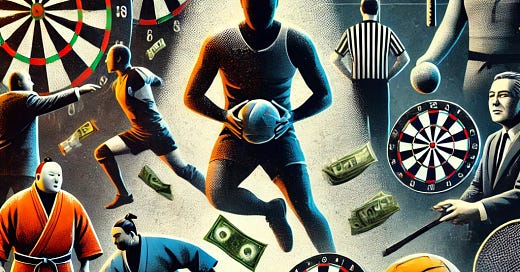Many Sports Left Behind in Global Match-Fixing Crisis
Football, tennis and basketball account for most anti-match fixing efforts worldwide? Table tennis, badminton, handball, even curling and darts, are suffering as a result.
There are many match-fixing databases out there, tracking which matches or games are showing suspicious results or odd betting patterns. Some are kept by the giants of the sporting world. Others are compiled privately by individual sports integrity observers curious to see just how bad things are getting.
World of Crime accessed one such database, kindly provided by one well-known integrity expert, tracking suspicious matches across a range of sports. Between May 29 and June 30, 2024, potentially indicative betting patterns and results were found across six sports: basketball, cricket, football, table tennis, tennis and volleyball.
Unsurprisingly, football matches dominated.
Forty-nine out of the 68 suspicious entries concerned football matches, eight were for basketball, four for volleyball, four for table tennis, three for tennis, and one for cricket. Football accounted for 72% of the total.
This article is part of World of Crime’s series on Organized Crime and Football, which investigates match-fixing, corruption, illegal gambling and organized crime connections to football and sport. Subscribe to our newsletter to follow this series.
That tracks with averages in larger databases. In Sportradar’s review of betting, corruption and match-fixing in 2023, football accounted for 66% of the 1,329 suspicious matches detected across the whole year and basketball was at 15%. Interestingly, e-sports accounted for just under 3.5% of incidents.
So, let’s focus on football first and worry about the rest later?
Well, that’s pretty much the situation already. Illegal betting surrounding football is the largest contributor to corruption in sports, which has soared to an astonishing $1.7 trillion a year, according to the United Nations Office on Drugs and Crime (UNODC).
And while the situation may, perhaps, be getting a little better in Europe, as World of Crime explored, it’s only getting worse elsewhere.
Betting-related match-fixing in football worsened by 16% in 2023, according to Starlizard, a UK-based sports and betting data company. Much of this corruption does not concern the English Premier League, La Liga or Serie A. These top leagues have poured millions into integrity service and their well-paid players are less likely to succumb to bribery.
Instead, match-fixing has shifted to opaque and lower-ranked leagues from around the world where direct supervision is almost impossible.
This phenomenon is nothing new. In The Fix, Dr. Declan Hill’s seminal investigation into match-fixing published in 2010, he describes an encounter with a shady Malaysian bookmaker who was an expert on betting patterns in the Icelandic football league.
But any arguments that sports betting remains a matter of ability and expertise are getting increasingly ludicrous.
A glance at lists of suspicious matches shows how hopeless rooting out match-fixing in football would be. The database accessed by World of Crime showed suspicious matches in the reserves of Argentina’s premier division, in Vietnam’s second division, in the fourth level of Romania’s football system, in Tunisia’s second league, in regional Brazilian tournaments, and even in Mongolia’s Premier League.
Despite these doubts, with suspicious matches supposedly being flagged, and with betting stopped on those matches, enforcement appears to be surface-deep.
The teams and leagues allegedly involved remain easy to bet on. In a couple of hours, World of Crime was able to place bets on every single football and basketball team involved in the suspicious matches flagged for May and June 2024.
Responsibility for detecting and suspending suspicious betting falls to sports data collection companies, like industry leader Sportradar, which also has contracts with federations around the world to help stop match-fixing.
But the problem seems unending.
“We’re seeing a lot of cases in Nigeria and Uganda. China quite often, Vietnam is almost every week, Mongolia is also every week. Russian women’s football is happening now. The more matches are being offered [by sports data companies to bookmakers], the more match-fixing will grow,” explained Francesco Barranca, former secretary-general of anti-match fixing organisation, Federbet, and former chairman of fair play and ethics at the Ukrainian Football Association.
So what about the other sports?
Match-fixers are equal-opportunity criminals. If there’s money to be made fixing a match or competition, any match in any sport, they’ll be there. While many of the largest match-fixing networks are headquartered in Southeast Asia and are closely connected to the Chinese market, these schemes are often complex and transnational.
Over 180 professional tennis players from around 30 countries were suspended for their part in a multi-million criminal ring fixing matches in the sport and run by Armenian mobster, Grigor Sargsyan, as revealed by a Washington Post expose in 2023.
Last March, eight Indonesian badminton players were banned for life or suspended after participating in a match-fixing ring. Their operations were carried over at least nine major international competitions on four continents over four years.
In 2023, a report by Denmark’s TV2 revealed extensive corruption in handball, with at least eight pairs of referees allegedly involved, including some having officiated at World Cup level.
An Australian table tennis player placed over 1,100 bets on fixed matches within the Ukrainian table tennis league.
OK, so it’s widespread, we get it.
Let’s keep going to drive the point home. The often-lampooned sport of curling has seen match-fixing allegations “from recreational leagues to the World Curling Tour.”
Three darts players were suspended in 2023 for suspicious betting activity in the Modus Super Series.
Close ties between sumo stables and organised crime in Japan have left the sport tarnished by a lengthy history of corruption and bribery.
Esports, with a global audience in the hundreds of millions, has seen match-fixing schemes tarnish competitions surrounding the most popular games in the world, including Starcraft, Dota 2 and Counter-Strike.
Slightly Infuriatingly, for comedy’s sake in this article, a potentially suspicious pétanque match in France turned out to be a false lead.
And while football is popular enough that match-fixing allegations have not tarnished its global image, some smaller sports have paid the price.
“Rowing, archery, and figure skating have all been killed by match-fixing,” Dr. Hill, author of The Fix, told World of Crime. “Look at figure skating. It used to be in the top 10 most watched sports.”
The ladies short program at the 1994 Lillehammer Olympics had 48.5 million viewers worldwide, the highest for any Winter Olympiad at the time. In 2014, at Sochi, its viewership had fallen by more than half to 21.4 million. It has continued to fall ever since.
A 2002 scandal where a French judge made a deal to allow a Russian pair to win in exchange for better scores for a French team is one of the more high-profile scandals to have marred the sport.
So does anyone care about the smaller sports?
It’s not that easy. There are people of vision and compassion in every federation who want to keep their sport clean. The larger sports account for most of the match-fixing overall and so get much of the attention. But this has essentially created a two-tier system where data and enforcement are uneven.
Take handball, which is highly popular in Europe. “Handball is not in our [anti-match fixing platform], says Guy Reinenbergh, national coordinator for sports fraud for Belgium’s federal police. “When it was created in 2016, it was decided by the government and the minister signed contracts with the federations. I am always in favour of having more sports around the table but there must be priorities.”
According to Reinenbergh, football, tennis and basketball are the top three priorities for Belgian authorities, although he acknowledges that other sports should not be ignored.
This lack of attention becomes even more severe when requiring the attention of police, judicial and government bodies outside the confines of the sporting world.
“If you look at it from the police side, you have homicide, drug trafficking, human trafficking, all these crimes that have a big effect on people. Sport is this very niche area where the damage is relatively low,” explained Chris Rasmussen, a lecturer in sports betting integrity at the University of New Haven and financial crime prevention specialist.
So how does this play out?
The two-tier match-fixing enforcement system has become entrenched.
In sports like football and tennis, cases of detection are much more frequent. For example, tennis authorities have established an independent body, the International Tennis Integrity Agency (ITIA). The ITIA’s website lists updated protocols for investigating match-fixing and corruption and regularly posts about the latest sanctions against players and officials. Since April alone, sanctions have been slapped on individuals from Algeria, Argentina, Austria, Bolivia, Bosnia and Herzegovina, the Czech Republic, Italy, Peru, Slovenia and Venezuela.
Such independent and comprehensive efforts are difficult to find in smaller sports. Some are making small strides. The International Table Tennis Federation appointed its first head of integrity in 2021.
Other sports depend on outside help. The World Curling Federation does not process reports of corruption directly but does so through the International Olympic Committee, according to its website.
Many complement their own integrity initiatives by turning to private companies like Sportradar, which manages and collects much of the data for those sports and also provides integrity services. This is the case for the International Handball Federation, the International Cricket Council, Badminton Europe, and Athletes Unlimited, which organises women’s basketball, volleyball, softball and lacrosse in the USA.
Policy Recommendations
More information-sharing across sports is essential.
Match-fixing networks rely on constant, instantaneous communication about which matches in which leagues are to be betted on and in which circumstances. The specific type of bet or spread, the type of manipulation, the amounts involved must be agreed upon between the players or officials involved, the fixers, the illegal bookmakers and their clients.
Yet the sporting world’s response seems stuck in first gear. In the case of Belgium highlighted above, a committee made up of more popular sports, including football, basketball, and tennis, regularly share information regarding suspicious betting patterns, players, referees and match officials being approached to throw matches. Smaller sports don’t get a look in.
“Anti-match fixing efforts are based on the notion that match-fixers are idiots. They’re not,” Dr. Hill tells World of Crime.
Acknowledge scope of problem.
For many federation officials, it seems that the aim is to prevent information about match-fixing from being made public or appearing in the press, rather than fighting the problem itself. In 2023, the TV2 report about match-fixing in handball was based on a report given by Sportradar to the European Handball Federation but which had been hidden away since 2018. This is but one of many similar examples.
“When you consider that match-fixing not only damages but directly destroys the unpredictability that is the essence of sports' power of fascination and commercial value, it is hard to understand why sports organisations, led by the International Olympic Committee (IOC), are fighting tooth and nail to avoid outside scrutiny,” wrote Jens Seyer Andersen, international director of Play the Game, after the handball revelations came out.
Yet, despite widespread acknowledgement of the issue, there has been precious little progress in systematising revelations about match-fixing, especially among smaller sports that can better avoid scrutiny.
Generalise and Democratise Use of AI
Sportradar attributed the detection of 977 suspicious matches to AI in 2023, a 123% increase from the year prior. 74% of all suspicious matches detected by Sportradar were done so through AI.
This risks creating a further technological gap in integrity efforts as some federations are able to consistently track suspicious patterns through AI on their own, while others will become increasingly dependent on private companies like Sportradar, creating potential conflicts of interest.





